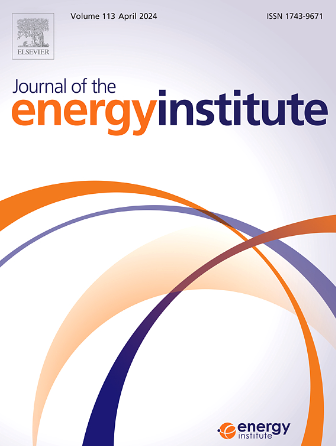Efficient hydrodeoxygenation of lignin-derived oxygenates over Ni/Al2O3-C catalyst under mild conditions
IF 5.6
2区 工程技术
Q2 ENERGY & FUELS
引用次数: 0
Abstract
Hydrodeoxygenation (HDO) is a crucial technique for upgrading biomass-derived compounds, playing a significant role in the advancement of sustainable energy technologies. Under harsh reaction conditions, conventional HDO catalysts often suffer from reduced efficiency due to particle aggregation. This study presents a highly efficient Ni/Al2O3-C catalyst that mitigates this issue by stabilizing Ni metal particles and enhancing metal-support interactions. Characterization of the catalyst was carried out using XRD, TEM, and CO-TPD, which revealed that the incorporation of Al species improved metal dispersion and reduced the size of the Ni particles. Guaiacol, a phenolic compound derived from lignin, was chosen to evaluate the HDO performance under mild conditions. The optimized Ni/3Al2O3-5C catalyst achieved a guaiacol conversion of 99.9 % with a cyclohexane selectivity of 99.8 % at 210 °C. The outstanding performance is attributed to the high hydrogenation capacity of the small Ni particles and the acid sites on the carbon surface. Metal-support interactions stabilize the Ni particles, preventing leaching and deactivation. The catalyst has also exhibited comparable effectiveness in the HDO of both lignin-derived compounds and lignin-oils, confirming its adaptability across various substrates. The study demonstrates that Al2O3-C plays a crucial role in enhancing both the structural stability and catalytic efficiency of HDO catalysts, offering a promising approach for upgrading biomass-derived compounds.

温和条件下Ni/Al2O3-C催化剂上木质素衍生含氧物的高效加氢脱氧
氢脱氧(HDO)是生物质衍生化合物升级的关键技术,在可持续能源技术的发展中发挥着重要作用。在恶劣的反应条件下,传统的HDO催化剂往往由于颗粒聚集而导致效率降低。本研究提出了一种高效的Ni/Al2O3-C催化剂,通过稳定Ni金属颗粒和增强金属支撑相互作用来缓解这一问题。采用XRD、TEM和CO-TPD对催化剂进行了表征,结果表明Al组分的加入改善了金属的分散性,减小了Ni颗粒的尺寸。以木素衍生的酚类化合物愈创木酚为研究对象,考察其在温和条件下的HDO性能。优化后的Ni/3Al2O3-5C催化剂在210℃下的愈创木酚转化率为99.9%,环己烷选择性为99.8%。这种优异的性能主要归功于小镍颗粒的高加氢能力和碳表面的酸位。金属支撑相互作用稳定镍颗粒,防止浸出和失活。该催化剂在木质素衍生化合物和木质素油的HDO中也表现出相当的有效性,证实了其在各种底物上的适应性。研究表明,Al2O3-C在提高HDO催化剂的结构稳定性和催化效率方面起着至关重要的作用,为生物质衍生化合物的升级提供了一条有前景的途径。
本文章由计算机程序翻译,如有差异,请以英文原文为准。
求助全文
约1分钟内获得全文
求助全文
来源期刊

Journal of The Energy Institute
工程技术-能源与燃料
CiteScore
10.60
自引率
5.30%
发文量
166
审稿时长
16 days
期刊介绍:
The Journal of the Energy Institute provides peer reviewed coverage of original high quality research on energy, engineering and technology.The coverage is broad and the main areas of interest include:
Combustion engineering and associated technologies; process heating; power generation; engines and propulsion; emissions and environmental pollution control; clean coal technologies; carbon abatement technologies
Emissions and environmental pollution control; safety and hazards;
Clean coal technologies; carbon abatement technologies, including carbon capture and storage, CCS;
Petroleum engineering and fuel quality, including storage and transport
Alternative energy sources; biomass utilisation and biomass conversion technologies; energy from waste, incineration and recycling
Energy conversion, energy recovery and energy efficiency; space heating, fuel cells, heat pumps and cooling systems
Energy storage
The journal''s coverage reflects changes in energy technology that result from the transition to more efficient energy production and end use together with reduced carbon emission.
 求助内容:
求助内容: 应助结果提醒方式:
应助结果提醒方式:


